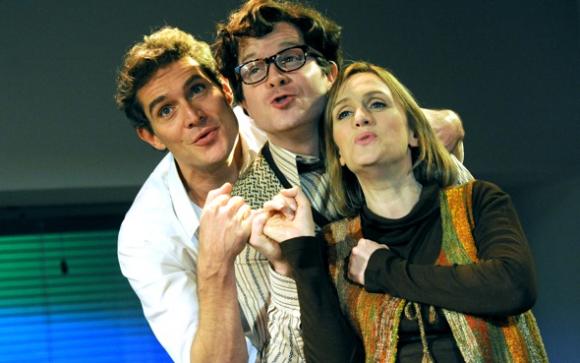This post is one in a series on friendship, explored through the lenses of Stephen Sondheim’s Merrily We Roll Along and C.S. Lewis’s The Four Loves.
The trio at the center of Merrily We Roll Along aligns fairly naturally into C.S. Lewis’s definition of friendship in The Four Loves. Frank is a composer, Charlie a playwright, and Mary an author/critic, and, when they start working together in “Opening Doors” (below — somewhat schmaltzy staging), they move from companionship to true amity:
https://www.youtube.com/watch?v=K5OI8xlM-a0Friendship arises out of mere Companionship when two or more of the companions discover that they have in common some insight or interest or even taste which the others do not share and which, till that moment, each believed to be his own unique treasure (or burden). The typical expression of opening Friendship would be something like, “What? You too? I thought I was the only one.” We can imagine that among those early hunters and warriors single individuals – one in a century? one in a thousand years? – saw what others did not; saw that the deer was beautiful as well as edible, that hunting was fun as well as necessary, dreamed that his gods might be not only powerful but holy. But as long as each of these percipient persons dies without finding a kindred soul, nothing (I suspect) will come of it; art or sport or spiritual religion will not be born. It is when two such persons discover one another, when, whether with immense difficulties and semi-articulate fumblings or with what would seem to us amazing and elliptical speed, they share their vision it is then that Friendship is born. And instantly they stand together in an immense solitude.
Even though the three friends are brought together by their creative spirits, it takes the audience a very long time to see how this spirit animated their friendship, because the show runs chronologically backwards. For a good long while, Frank and Charlie aren’t working together, and aren’t even speaking to each other, so there’s no chance to see them enjoying each other’s delight. Mary manages to keep her connections alive longer, but, her relationships with the two men are intrinsically less fruitful; since her oeuvre doesn’t cross over with theirs. (And they seem to have little interest in hers, given that the audience learns that she’s written a bestseller, but otherwise is told nothing about her book).
Instead of watching them be friends, the audience sees the trio demand that the others live up to the duties of a friend. The pleas aren’t necessarily illegitimate, but, as one of the attendees at my birthday party pointed out, astutely, that, although loyalty comes with friendship, if friends ever appeal directly to this duty, something already has gone very wrong in the relationship. In normal circumstances, you’d appeal to a friend’s love, not their duty. As Lewis puts it:
Friendship is utterly free from Affection’s need to be needed. We are sorry that any gift or loan or night-watching should have been necessary – and now, for heaven’s sake, let us forget all about it and go back to the things we really want to do or talk of together. Even gratitude is no enrichment to this love. The stereotyped “Don’t mention it” here expresses what we really feel. The mark of perfect Friendship is not that help will be given when the pinch comes (of course it will) but that, having been given, it makes no difference at all. It was a distraction, an anomaly. It was a horrible waste of the time, always too short, that we had together. Perhaps we had only a couple of hours in which to talk and, God bless us, twenty minutes of it has had to be devoted to affairs.
For of course we do not want to know our Friend’s affairs at all. Friendship, unlike Eros, is uninquisitive. You become a man’s Friend without knowing or caring whether he is married or single or how he earns his living. What have all these “unconcerning things, matters of fact” to do with the real question, Do you see the same truth? In a circle of true Friends each man is simply what he is: stands for nothing but himself. No one cares twopence about anyone else’s family, profession, class, income, race, or previous history. Of course you will get to know about most of these in the end. But casually. They will come out bit by bit, to furnish an illustration or an analogy, to serve as pegs for an anecdote; never for their own sake.
I particularly enjoy this quote, because when I went to college, parents and relatives would always be inquisitive about the new friends I’d made, asking where they’d grown up, what their parents did, or even what other classes they were taking. I knew the answers to none of these, since I already knew that I liked talking to them, and all the rest seemed relevant only so far as it provided illustrative anecdotes for our discussions. (Though a number of my friends turned out to disagree).
When a friendship starts to weaken, maybe it sometimes makes sense to put less effort into fixing it than into just doing whichever part of it you like best, and seeing if that helps. I’ve sometimes told friends who are trying to decide whether to break up with a boyfriend or girlfriend to try just doing the things they like best for a week or a month — the things they’d do if they knew their partner was shipping out, and they wanted to make the most of the time they had. Solemn discussions about where this relationship is going seldom make the list.
Those conversations may not be able to be prorogued forever, but after a month of doing the things you delight in, you may be more motivated to have it charitable, or it might be clearer that it’s not worth having at all. Anything to avoid the fate of Frank, Charlie, and Mary, who used more of their time and energy to discuss their friendship than to participate in it, till all that was left was the history and the obligations.












